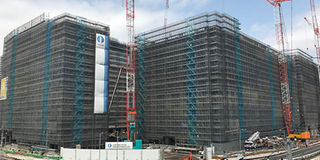IAAF World Relays Notebook - Day 5

Construction work at the Tokyo 2020 Olympic Games’ Athletes’ Village on May 13, 2019 A section of the Village is being constructed using timber donated from different regions in Japan. PHOTO | ELIAS MAKORI |
What you need to know:
- The donated timber will then be returned after the Games and used as an Olympic legacy. “A total of 63 local municipalities across the country were approved to take part in this project,” organisers say.
- Tokyo 2020 has also signed a “letter of intent”, in conjunction with the United Nations, aimed at promoting the contribution of sport to sustainable development goals (SGDs).
Face recognition planned for high-tech Olympics
*****
Organisers of next year’s Olympic Games in Tokyo have promised to deliver the most technologically advanced Games, and will introduce face recognition technology for accredited personnel.
Tokyo 2020 spokesman Masa Takaya Monday said: “There will be a face recognition system for all accredited persons.
Security checkpoints are traditionally managed by security personnel, but we are now going to be more robust with gates automatically opening upon recognizing the accredited person’s face,” he explained.
“Ensure your face doesn’t change much between the time of accreditation and competition,” he joked. The accreditation will also serve as visas.
Tokyo’s big plans to fight Games traffic
*****
Tokyo metropolitan authorities are introducing a Traffic Demand Management System to help ease traffic congestion during 2020 Olympics.
The system’s success will largely depend on co-operation from the public who are being urged to avoid non-essential errands and to work from home during the Olympic period. “We are advocating for people not to use their cars during the rush hour and to also order their daily supplies in bulk to help reduce the congestion on the roads, Games spokesman Masa Takaya says.
“We’ll conduct a test to see the outcome, and we shall keep reviewing the system.”
Cooling system planned for marathon runners
*****
With soaring temperatures expected during next year’s July 24 to August 9 Tokyo Olympics, organisers, in conjunction with the Tokyo Metropolitan Government, have devised advanced methods to beat the heat.
A “heat blocking surface” has been laid over 100 kilometres of Tokyo’s roads, covering the entire 42-kilometre route the marathon races will go through.
This technology basically reduces heat on the surface of the road which, in turn, makes the entire environment a lot cooler.
This should be welcome news for Kenya’s Eliud Kipchoge who will be gunning to defend his Olympic marathon title in Tokyo.
Locals’ big contribution to Athletes’ Village for Games
*****
Construction work at the Tokyo Olympic Games’ Athletes’ Village is at an advanced stage. Interestingly, the “Village Plaza” inside the Athletes’ Village is being constructed using timber donated from different regions in Japan.
The donated timber will then be returned after the Games and used as an Olympic legacy. “A total of 63 local municipalities across the country were approved to take part in this project,” organisers say.
Tokyo 2020 has also signed a “letter of intent”, in conjunction with the United Nations, aimed at promoting the contribution of sport to sustainable development goals (SGDs).





